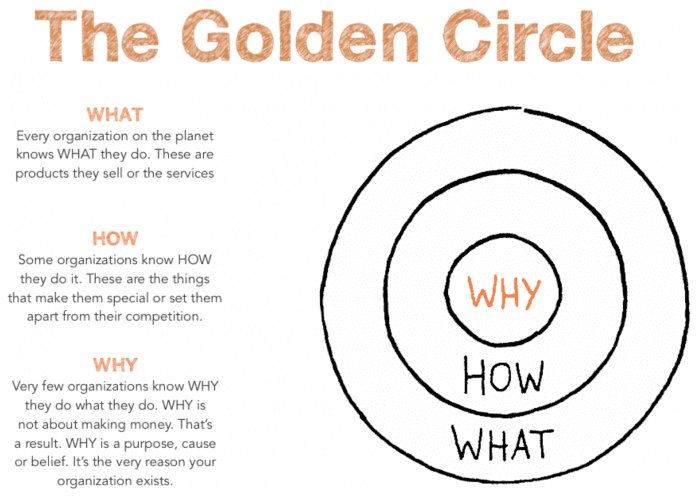German Philosopher Friedrich Nietzsche once quipped “He who has a strong enough why can bear almost any how.” The entrepreneurial journey is a roller coaster ride of ups and downs, false starts, failures, and successes. Succeeding as an entrepreneur requires having a strong Why and purpose to whether the storm and challenges.
In Start with Why: How Great Leaders Inspire Everyone to Take Action, British-American author Simon Sinek describes the significance of leadership and purpose to succeed in life and business. He argues that the leaders who’ve had the greatest influence in the world all think, act, and communicate the same way — and it’s the opposite of what everyone else does.
Start with a strong WHY
Companies and organizations with a clear sense of WHY never worry about it. They don’t think of themselves as being like anyone else and they don’t have to “convince” anyone of their value. They don’t need complex systems of carrots and sticks. They are different, and everyone knows it. They start with WHY in every thing they say and do.
Knowing your WHY is not the only way to be successful, but it is the only way to maintain a lasting success and have a greater blend of innovation and flexibility. When a WHY goes fuzzy, it becomes much more difficult to maintain the growth, loyalty and inspiration that helped drive the original success.
The Golden Circle
A framework upon which organizations can be built, movements can be led, and people can be inspired. And it all starts with WHY.
The Golden Circle provides compelling evidence of how much more we can achieve if we remind ourselves to start everything we do by first asking why. The Golden Circle is an alternative perspective to existing assumptions about why some leaders and organizations have achieved such a disproportionate degree of influence.

- WHAT: Every single company and organization on the planet knows WHAT they do. This is true no matter how big or small, no matter what industry. Everyone is easily able to describe the products or services a company sells or the job function they have within that system. WHATs are easy to identify.”
- HOW: Some companies and people know HOW they do WHAT they do. Whether you call them a “differentiating value proposition,” “proprietary process” or “unique selling proposition,” HOWs are often given to explain how something is different or better. Not as obvious as WHATs, many think these are the differentiating or motivating factors in a decision. It would be false to assume that’s all that is required. There is one missing detail:
- WHY: Very few people or companies can clearly articulate WHY they do WHAT they do. When I say WHY, I don’t mean to make money—that’s a result. By WHY I mean what is your purpose, cause or belief? WHY does your company exist? WHY do you get out of bed every morning? And WHY should anyone care?
People don’t buy WHAT you do, they buy WHY you do it.
Leadership vs Leading
Leading is not the same as being the leader. Being the leader means you hold the highest rank, either by earning it, good fortune or navigating internal politics. Leading, however, means that others willingly follow you—not because they have to, not because they are paid to, but because they want to.
Those who lead are able to do so because those who follow trust that the decisions made at the top have the best interest of the group at heart. In turn, those who trust work hard because they feel like they are working for something bigger than themselves.
On Culture
A company is a culture. A group of people brought together around a common set of values and beliefs. It’s not products or services that bind a company together. It’s not size and might that make a company strong, it’s the culture—the strong sense of beliefs and values that everyone, from the CEO to the receptionist, all share. So the logic follows, the goal is not to hire people who simply have a skill set you need, the goal is to hire people who believe what you believe.
People don’t buy WHAT you do, they buy WHY you do it,
People don’t buy WHAT you do, they buy WHY you do it, and Apple says and does only the things they believe. If WHAT you do doesn’t prove what you believe, then no one will know what your WHY is and you’ll be forced to compete on price, service, quality, features and benefits; the stuff of commodities. Apple has a clear and loud megaphone and is exceptionally good at communicating its story.
When people know WHY you do WHAT you do, they are willing to give you credit for everything that could serve as proof of WHY. When they are unclear about your WHY, WHAT you do has no context. Even though the things you do or decisions you make may be good, they won’t make sense to others without a clear understanding of WHY.
Learning the WHY of a company or an organization or understanding the WHY of any social movement always starts with one thing: you.
Every company, organization or group with the ability to inspire starts with a person or small group of people who were inspired to do something bigger than themselves. Gaining clarity of WHY, ironically, is not the hard part. It is the discipline to trust one’s gut, to stay true to one’s purpose, cause or beliefs. Remaining completely in balance and authentic is the most difficult part. The few that are able to build a megaphone, and not just a company, around their cause are the ones who earn the ability to inspire. In doing so, they harness a power to move people that few can even imagine.
Looking to build your successful tech Startup? Join our 12-week cohort of tech startups for Black founders by Black industry experts.
